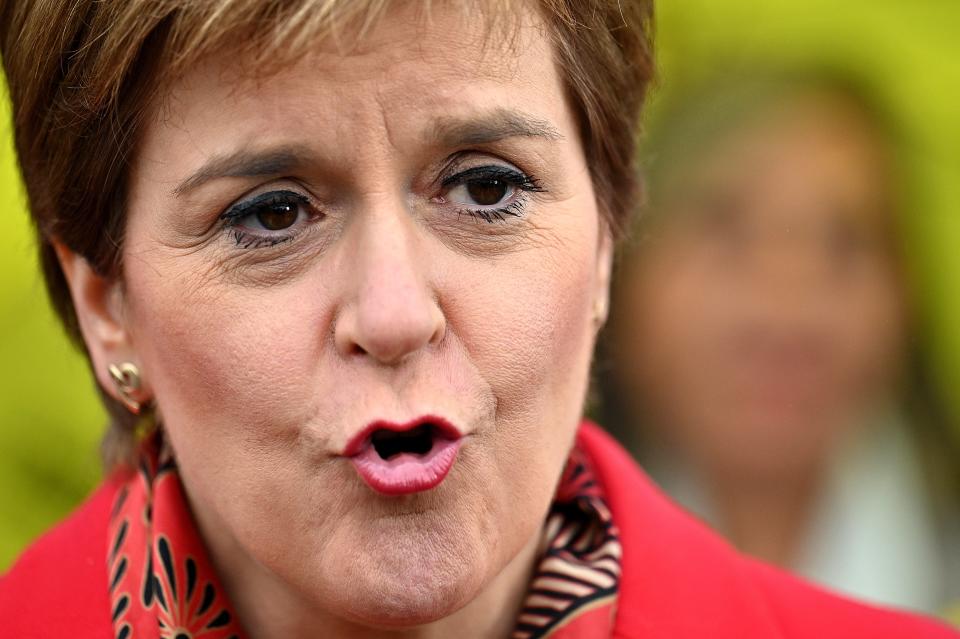Blocking IndyRef2 would put Boris Johnson ‘in opposition to will of Scottish people’, Nicola Sturgeon says

Nicola Sturgeon has said the results of the Scottish election have delivered a mandate for an independence referendum within the next five years, and Boris Johnson will be “standing in direct opposition to the will of the Scottish people” if he tries to block it.
The Scottish National Party leader threw down the challenge to Mr Johnson in a speech accepting victory in the Holyrood election.
With all results declared north of the border, the SNP had increased its representation at Holyrood by a single MSP to 64, one less than the 65 needed for an overall majority.
And with eight MSPs from the Scottish Greens also committed in their manifesto to a referendum, Ms Sturgeon said the results clearly demonstrated that a fresh vote is “the will of the country”.
Conservatives took second place with 31, with Labour on 22 and Liberal Democrats on four, giving a tally of just 57 pro-Union MSPs against 72 in favour of separation from the UK.
But Ms Sturgeon said that, combined with the pro-independence Scottish Greens, there is now a “clear majority” of MSPs elected on a platform of delivering a referendum within this parliament.
The SNP leader declared that there was “no democratic justification whatsoever” for the prime minister or the UK government to attempt to block a referendum following the results of this week’s elections.
She accused those who referred to the independence call as a “demand” from the SNP of “desperately trying to rewrite the basic rules of democracy and redefine what constitutes an election win and a mandate”.

Ms Sturgeon said: “The people of Scotland have voted to give pro-independence parties a majority in the Scottish Parliament – the final tally is not yet known, but it looks likely that the pro-independence majority will be larger in this parliament than in the last one.
“The SNP and Scottish Greens both stood on a clear commitment to an independence referendum within the next Parliamentary term.
“And both of us said that the timing of a referendum should be decided by a simple majority of MSPs in the Scottish Parliament. So in no way is a referendum just a demand of me or the SNP.
“It is a commitment made to the people by a majority of the MSPs who will take their seats in our national parliament next week.
“Usually – and by the normal standards of democracy – parties are expected to deliver on the commitments they make in elections, not face attempts to block them from doing so.
“Given the outcome of this election, there is simply no democratic justification whatsoever for Boris Johnson or anyone else seeking to block the right of the people of Scotland to choose our future.
Nicola Sturgeon made plain that “just as we said in the election – the people in Scotland must have the right to decide our own future when the Covid crisis has passed”
A Scottish Green source said there were currently “no plans” for coalition talks with the SNP.
With recent polling suggesting that an IndyRef2 could produce the same No vote on independence as the earlier 2014 ballot, it is unclear how soon Ms Sturgeon will seek to call a referendum.
She has said it must wait until the Covid crisis is over, and both the SNP and Green manifestos commit the parties only to a vote within the five-year term of the Scottish Parliament, which runs to 2026.
Under Article 30 of the Scotland Act, the first minister must seek authorisation from the UK prime minister for a referendum, something which Mr Johnson is likely to withhold.
But she has pledged to “proceed with the legislation that is necessary”, warning that if it is passed by the Scottish Parliament, the PM would need to go to the Supreme Court to stop it.
Cabinet minister George Eustice branded a referendum “a complete distraction”. “It would be irresponsible to have another divisive referendum and another bout of constitutional debate at a time when we are charting our way out of this pandemic and when we’ve got to really focus on economic recovery,” Mr Eustice told Times Radio “We think it’s completely the wrong thing to be doing. We had a referendum just a little over five years ago and that settled the issue.”
Scottish Tory leader Douglas Ross, who was returned to Holyrood on the Highlands and Islands regional list, has said he will not “shy away” from fighting plans for an independence referendum. SNP hopes of an overall majority were dashed by the Conservatives holding on to the key marginal seat of Aberdeenshire West, with a nine-point increase in the Tory vote apparently reflecting tactical voting by pro-Union voters, who deserted Liberal Democrats and Labour.
Former first minister Alex Salmond missed out in his bid to return to the Scottish Parliament as his newly-minted Alba Party failed to win a single seat.
Mr Salmond cast doubt on Ms Sturgeon’s commitment to a referendum, saying the first minister “lost her nerve” on Scottish independence in 2017.
“Nicola will prevaricate, Nicola lost her nerve on independence back in 2017 and has never recovered it,” Mr Salmond said.
“It’s as simple as that.”
Read More
‘Levelling up’ cash to go to help NHS recover from Covid, Boris Johnson says
Sadiq Khan wins second term as London mayor despite tighter-than-expected race
Angela Rayner sacked as Labour chair over disastrous election results

 Yahoo Finance
Yahoo Finance 